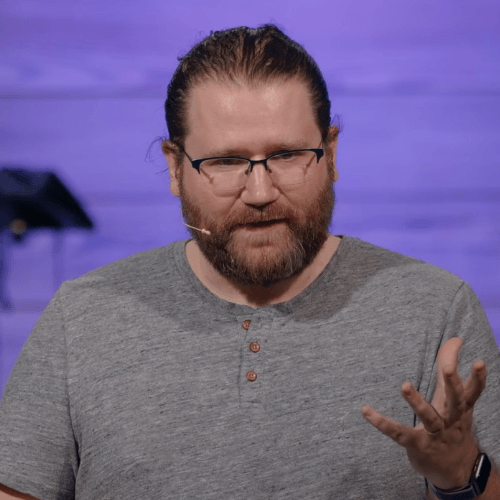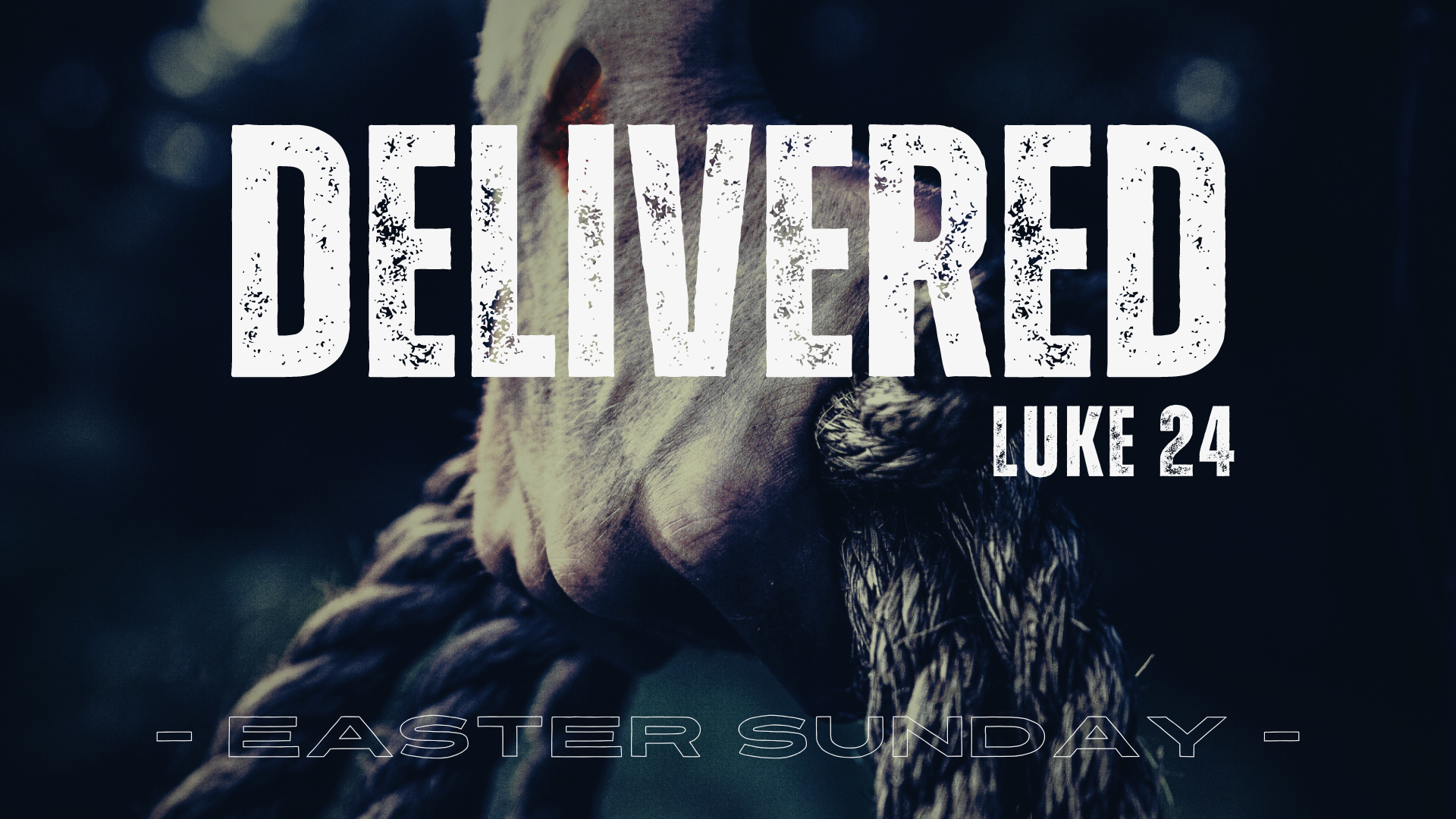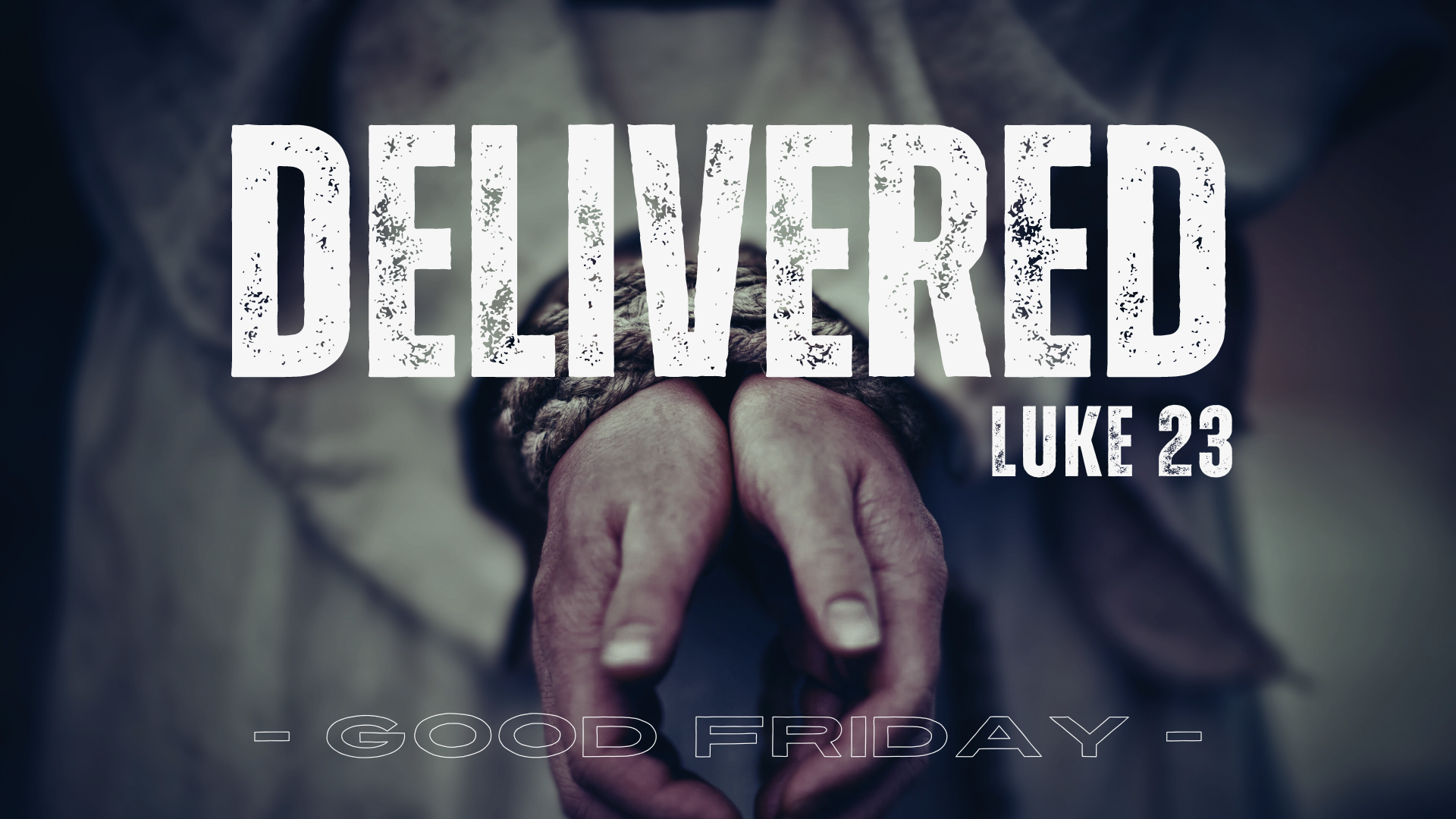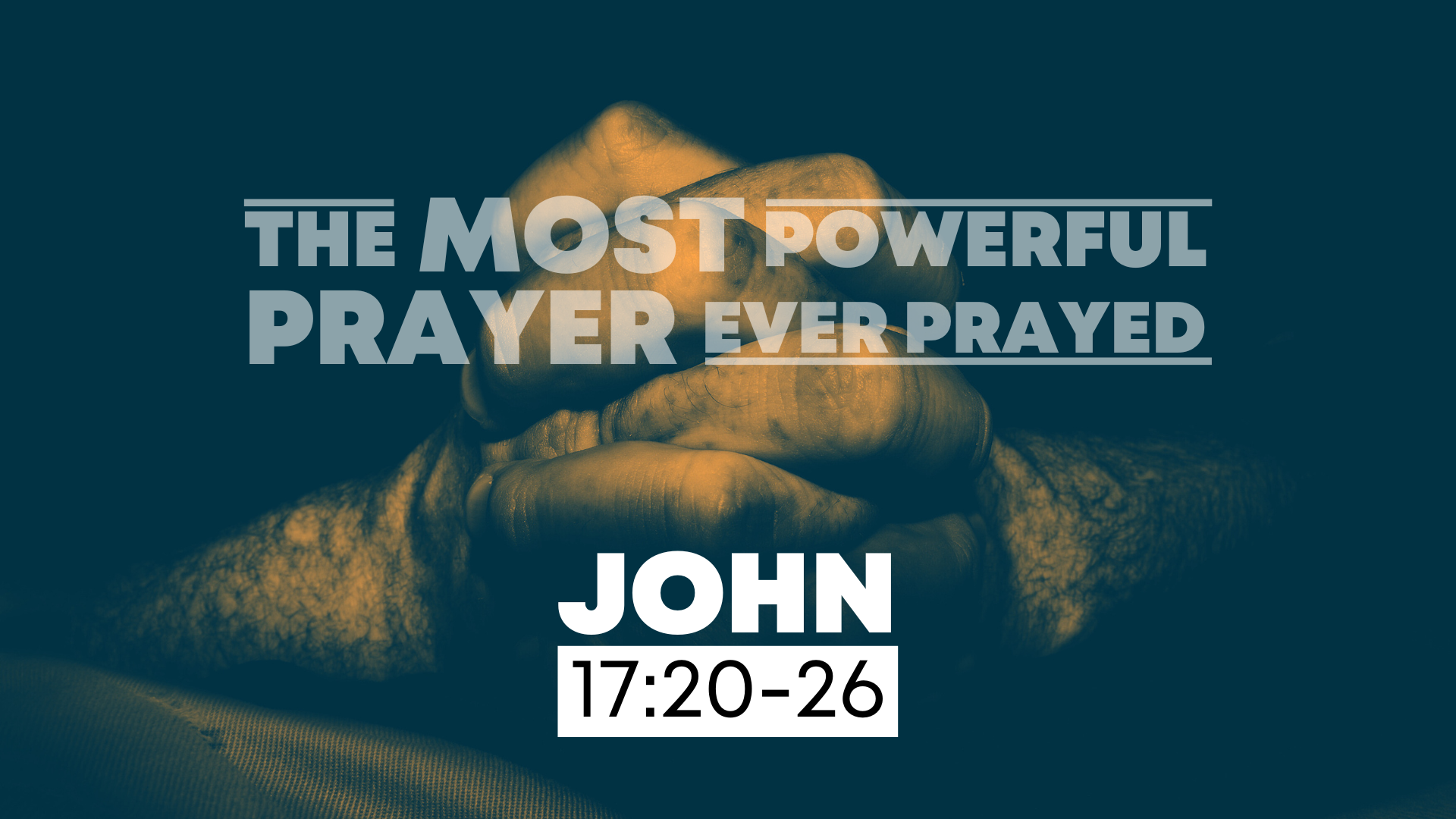Sunday Service 9am & 11am
Wednesday Service 7pm
(210) 920-6502
551 E Nakoma St.
San Antonio, TX 78216
Join a small group to study this sermon with like-minded believers.
Luke 5:1-11
LISTEN. STUDY. APPLY.
Video
Audio
Manuscript
We will be looking at a well-known passage of Scripture today. So, get your Bibles ready.
But before we jump into the text, I want to ask you a question. You don't have to answer out loud but think about this for a moment:
What does it mean to be a "good" Christian?
When you think about your life--your faith--would you say that, yes, I am a good Christian?
Elder elders of a large church recently polled their congregation asking "how they saw themselves spiritually."
Of the 9,877 respondents…
50% felt as though they've stumbled one too many times for God to use them
45% felt closer to breakdown than breakthrough
92% considered themselves "tilted halo" Christians not "super saints." (Meaning, they didn't think they were measuring up as Christians.)
And 48% believed this statement: "God helps those who help themselves."
These results might be surprising to you—but they are far from unusual. Perhaps if we polled our church, we might get similar results.
By the way, the phrase "God helps those…" is not in the Bible. It originated in ancient Greece from pagans.
There might be some folks here today who think they have to earn their way into heaven. You might be under the impression that God is looking for over-achievers.
As we'll see today from our text, that is not the case. There is only one way to heaven—and that is by believing in Jesus. Good works won't save you.
There might be other folks here today, who know they are saved by Jesus. You are a believer in Jesus—perhaps been one for a long time.
But you consider yourself one of those "tilted halo" Christians. You assume that you were saved by grace—which is God's unmerited favor—but after that?
You might be thinking God is measuring you by your performance. By your good works, by your behavior.
But, as we'll also learn from today's text, that is not true.
Today, we are going to look at a person we often consider a "super" Christian. And we are going to find out that he was no different from you or me.
We are going to learn what really determines our "success" in the Christian life. And it's not our self-effort…
Spoiler: it's grace!
Let's turn to Luke 5…
Luke 5:1,2: Jesus Reaches the Sea of Galilee
“On one occasion, while the crowd was pressing in on him to hear the word of God, he was standing by the lake of Gennesaret, and he saw two boats by the lake, but the fishermen had gone out of them and were washing their nets.” (Luke 5:1–2, ESV)
Let's quickly get our bearings. Luke 5 opens in the early days of Jesus' ministry. He is traveling around a region called Galilee in Northern Israel.
He had just been rejected by the people from his hometown, Nazareth. From there, he visited other towns, teaching in their synagogues—healing many people.
The end of chapter 4 tells us that even as Jesus tried to leave, the people stopped him.
They were desperate for his help. As we just read they were pressing on him. Dozens, if not hundreds of people were crowding around Jesus.
He said he had to preach to other towns, yet he wasn't going to turn these people away.
Already, we see God's grace manifested in the person of Jesus. When he saw people in need, he helped them.
Jesus never turns away people in need. Now, this seems pretty obvious. But it's shocking how often we forget this.
For a moment, let's consider the irony of this situation. Why do I say "irony"?
Well, these weren't pagans. They were Jews. In every town, there were synagogues and teachers.
Yet the rabbis had so failed their job at teaching the people, they were pressing on Jesus to hear the word of God.
We shouldn't be too hard on these rabbis, after all, nobody can teach like Jesus.
Teachers in the room. Ministry leaders. Those of you who volunteer in this church. Hear me when I say this: the people you serve need Jesus.
They don't need you or me. They need to see, hear, and touch Jesus.
They need people so overflowing with the love and grace of Jesus, that they will press around us to see him.
Church, let's make it our priority to be filled with Jesus. You don't need to impress people with your wisdom, skills, or personality.
You just need to show them Jesus.
Even if those rabbis were amazing, they did not have what the people really needed. That was found in Jesus.
As we see in this passage, so many people were coming to Jesus, they couldn't fit in one synagogue!
So, we see him leading the people to this lake—what we call the Sea of Galilee.
The shores of the lake would provide ample room for all the people. The land slopes upward, from the water, serving as a kind of natural auditorium.
A good place for Jesus to teach.
But the text goes on to mention something odd: there were two boats by the lake. And the fisherman were still there, washing their nets.
Why was this odd? Well, the fishermen in this region worked at night and they sold their catch in the day.
Why aren't they in the market selling their fish?
Already, Luke is setting up the main conflict of this passage, which we will look at in just a moment.
Luke 5:3: Jesus gets into Simon's Boat
“Getting into one of the boats, which was Simon’s, he asked him to put out a little from the land. And he sat down and taught the people from the boat.” (Luke 5:3, ESV)
Seeing a prime opportunity to teach everyone at once, Jesus gets into Simon's boat. Simon agrees to help Jesus by rowing out into the shallows.
Jesus' voice would have carried over the water from where he was to the people on the shore.
But notice how it says that Jesus sat down. Why does Luke mention that?
Sometimes the Gospels point this out—that Jesus sat down when he taught. In Jewish culture, rabbis sat when they taught. To them, it was more dignified.
But that's not why Jesus did it.
Yes, he was in a boat—and you don't stand up and rock the boat! But there is something else.
I believe this was a sign. Jesus sat, to illustrate an important truth: He always did things from a place of rest.
He only did what the Father led him to do. There was never any fear or hastiness coming from Jesus.
You'd think Jesus—the Savior of the World—would be antsy. He only had a few years to do his work.
Come on, Jesus—get going! You just said you had other towns to get to. Why are you just sitting and teaching these people—people you've already taught!?
This is our first point about grace. Point 1: Grace defies our earthly expectations.
Odd huh? You might not have expected that to be our first point. But this is one of the most important things we must learn about grace.
All of us have grown up living and thinking a certain way. Just like our friend Simon, we think and live very differently than God.
After all, he said his ways are higher than our ways, right? So, maybe we should be willing to admit that part of how we think or live is wrong.
Remember that survey from the start? Many Christians don't seem to understand who they are in Christ.
Just think about it. When we are striving, hurrying, frantic, worried… Jesus is sitting.
The people he taught here had the same problems we have. Crises, sicknesses, war, oppression, fears about the future, and so on.
But Jesus didn't seem all that worried. He was cool. He was collected. He always knew what to do and when to do it.
Do we want to be like that? Oh, you might say, "Adam that was Jesus. I have to be frantic or worried—that's just life!"
But didn't we turn to Jesus because we admitted that our ways were wrong in the first place?
Jesus didn't behave like the other rabbis. He wasn’t interested in impressing these people or winning their popularity.
He only wanted to give them what they desperately needed: himself.
Grace defies our earthly expectations. Here me now, church. If you want to walk in the New Covenant. Walk in it, not just enter it.
You need to realize that God's grace will defy what you sometimes think is right. What you think you need to do to be a "good" Christian.
What do I mean by that? Well, let's find out as we continue.
Jesus is about to show us, in living color, exactly what grace does for us.
Luke 5:4, 5: Jesus's Command and Simon's Response
“And when he had finished speaking, he said to Simon, 'Put out into the deep and let down your nets for a catch.” And Simon answered, 'Master, we toiled all night and took nothing! But at your word I will let down the nets.'” (Luke 5:4–5, ESV)
You know what happens next—but let's not rush past this moment.
After Jesus finished speaking to the masses, he turned his attention to one man.
This happens a lot in the Gospels. And it's one of the most wonderful things about our Jesus.
As we see again and again in the Gospels Jesus spent a lot of time tending to multitudes, the large crowds.
But after doing all that, he focused on Simon. Jesus never misses anyone. Nobody is forgotten by him.
Perhaps you're here today and you feel like you've "slipped through the cracks." Maybe you feel as if the world has passed you by.
God has not forgotten you. Jesus never forgets a single person.
There was a time in my life when I felt overlooked. My parents were divorced and I was the only boy in a household of women.
You can imagine how often I felt like the odd man out.
As an introvert, I struggled to fit in at school. By the time I was in my teens, I felt very much like an outsider. Alone and forgotten.
But Jesus never forgot me. Even in my sin, he revealed himself to me. He accepted me and made me a son of the Father.
He became the friend I needed.
This world is very good at neglecting people. Society is drawn to the loudest and proudest person in the room.
Those of us who aren't the strongest, smartest, or coolest are usually ignored.
But God never overlooks us. Jesus is a friend to the lowly. He is close to the brokenhearted.
You are not forgotten.
Even after Jesus spent so much time teaching the crowd, he took the time to care for Simon.
Let's imagine for a moment what Simon must have been thinking. At this point, he already knew who Jesus was.
In Luke 4:39, Jesus had performed a miracle before Simon's eyes—healing his mother-in-law of a fever. So, Simon knew he was at least a prophet.
But think about what was going on in Simon's mind, as Jesus taught everyone else.
Remember, what he just admited. Something had gone very wrong the night before.
He spent hours laboring and came up with nothing. That's a big problem, for a professional fisherman.
Maybe he was thinking something like this:
"Yeah, what Jesus is saying is nice. But what am I going to do about my bills? What about my family? God cares for all these people, but he must not care about me. Probably, because I'm such a screw-up."
As he's thinking this way, Jesus tells him to go back out and try to catch fish. Don't rub it in, Jesus!
"What does this guy know about my profession? Jesus, you're a good guy. You healed my family. You know the Torah, good. But leave the fishing to the fisherman."
Maybe something like that? Can you imagine the frustration he and his partners were feeling? All that hard work, all night long, to end up with nothing.
Sound familiar? Have you ever toiled—worked with all your might—but still failed?
Remember, fishing was Simon's vocation. He probably had been doing it since he was a boy. He was confident he could do it. He knew this lake like the back of his hand.
Yet for all his skill, experience, and effort… he could not catch a single fish.
Simon's plight is a picture of our self-effort—a kind of "merit." He worked all night, in his own strength, but failed.
The same is true for us. Maybe for a while, we can succeed in our own power.
But, there will come a day when all our efforts will fall short. No amount of hard work will produce what we need.
You see—and this is very important—Simon was raised to believe what everyone believed back then.
The rabbis taught that if you were a Jew and you worked hard, obeying the Law of Moses, God would bless you.
So, if you were struggling, if you didn’t get the results you wanted, it must be your fault!
Simon had yet to experience God's grace. Grace is for the undeserving. It's not for the super saints, the people who can earn God's approval by what they do.
(Spoiler again: there are no people who can do that!)
He probably assumed God was punishing him because of his sins. He didn't deserve God's helping him with a catch of fish.
Yet, Jesus tells him to lower his nets for a catch. Despite what Simon might have been thinking, Jesus was concerned about his problem.
Nobody slips through the cracks with Jesus. Even grumpy, undeserving fools like Simon—and us—are remembered by him.
Now, this is what I love about Simon. He was in a dark place, a hopeless place. He didn't understand what Jesus was saying.
How does he respond, though? "At your word, I will let down the nets." Wow.
Here is something very encouraging: You will never fail if you simply listen to Jesus.
Now, by the world's standards, you might "fail." But we're not living by the world's standards, are we?
Paul tells us that God "always leads us in triumphal procession." You can't lose when you listen to Jesus.
For some of you, you don't know what your life will look like if you listen to Jesus.
He might be leading you to do something unexpected. Or, he is calling you for the first time, to lay down your life and believe in him.
You certainly won't regret heeding what Jesus says. Simon is about to discover that.
Luke 5:6, 7: The Miraculous Catch of Fish
“And when they had done this, they enclosed a large number of fish, and their nets were breaking. They signaled to their partners in the other boat to come and help them. And they came and filled both the boats, so that they began to sink.” (Luke 5:6–7, ESV)
After toiling for hours and hours and getting nothing, Jesus provides so many fish that their boats began to sink!
We often look at this moment and think about Jesus' miraculous power. And we should.
This miracle proves his authority over the natural world. As the One who created all life, Jesus was able to command those fish into the nets.
And boy did those fish respond!
This is a major turning point in Simon's life. But what is God teaching us in this passage? That if we turn to Jesus, he is going to give us a lot of fish?
Well… I hope not. I don't know what I'd do with that many fish.
Let's look at the dramatic contrast between what Simon had experienced the night before, versus what Jesus just did.
All of Simon's self-effort—all his merit—could not get a single fish into his net. But in just seconds, Jesus provided more fish than he could have caught over many nights.
This is our second point about grace. Remember, grace defies our earthly expectations. Also…
Point 2: Grace provides what our self-effort cannot.
This is where I might lose some of you. So, I'm going to do my best to explain this truth.
You might be under the impression that grace is only about forgiveness of sins.
We often talk that way as Christians. When I mess up, there's grace. When someone sins, we show them grace.
It's true we are saved by grace. That's very important. We can't do anything to earn God's forgiveness.
We can only be saved—given eternal life—because Jesus took our sins on the cross.
That is God's grace, his unmerited, unearned favor given to unworthy sinners, because of Jesus.
But that's only the beginning of the role grace plays in our lives. Grace isn't just the door to Christianity. It is the foundation of our walk with God.
What do I mean by that?
There are only two ways you can receive something in life, as we see from Simon's experience:
You can either earn it or you can receive it as a gift.
Grace is a gift. It is God's unmerited, unearned favor. You cannot work to be worthy of God's grace.
Oswald Chambers said, "Grace is the overflowing favor of God." Grace is how God provides for his people.
Even in the Old Testament, we see God doing good for those who don't deserve it. The same is true today for born-again Christians.
We are not "successful" Christians because of what we do.
We are successful—if you want to use that term—because God provides grace.
Remember that poll? Ninety-two percent of those Christians thought they had "tilted halos" meaning, they weren't "good" or deserving Christians.
Some of them even thought they had failed too many times for God to use them. Do you think that way, today, my friend? It's not true.
Why do we think that way, though? I think it's because we believe being a "good" Christian is about what we do.
Remember Simon. He toiled all night and got nothing. All his self-effort—work in his own earthly power—failed him.
But he was a good Jewish boy. He had been taught that God only blessed those who deserved it—because they were Jewish and followed the law.
That is what we call merit: being worthy of something because of what you do or what you are (or what you have).
Like all Jews at the time, Simon believed he was struggling because he wasn't working hard enough to please God.
Even when he did the right thing—working through the night to provide for his family—it wasn't enough.
Now, here comes Jesus, giving him something he didn't earn. It had nothing to do with Simon's worthiness. He couldn't work for this gift.
The same is true for every single one of us here. Yes, we are saved because of grace.
If you are here today and you do not know Jesus, there is nothing you can do to save yourself.
You must believe in Jesus Christ. He will save you. Because he loves you.
If you are a Christian, you are standing in grace. God provides for you, cares for you, because of grace, not because of what you do.
You might disagree with that. You might say, "Simon had to let down the net! Doesn’t that mean you have to obey God before you can get his help? Doesn't that mean we have to earn God's support by what we do?"
You know, I was thinking about an answer to this question—when something struck me in the text.
What does verse six say again? That Simon let down the nets? No. It says "And when they had done this, they enclosed a large number of fish…"
Simon didn't do it by himself. He had help. Who was in the boat with him? Was it Andrew? The Bible tells us about only one other person in that boat.
It was Jesus. Interesting, right? Jesus tells Simon to let down the nets, yet they do it together.
God doesn't expect you to do anything on your own. Jesus is doing it with you. We don't serve God so much as we serve with God.
You cannot expect to do anything as a Christian in your own power. You need Jesus' help. And he's giving you his help before you do anything to earn it.
Jesus gave Simon this huge catch of fish, to show him his grace. God's grace is for those who don't deserve it and can't earn it. That includes you and me.
But let me give you a warning. Our human nature really hates this.
Even seasoned Christians who have been saved for many years need to remember: you are accepted by God because of grace, not your performance.
This stuff called the flesh wants to earn God's approval.
But the Gospel cuts against that human pride. Grace always defies our earthly expectations.
Some people fear grace because they think it leads to laziness or backsliding. But look at how busy these men became the moment Jesus manifested his grace.
They were pulling in so many fish their boat was sinking. Simon had to get James and John to help.
Grace makes you lazy? I don't think so! When we stop trying to perform and just enjoy God's provision, we suddenly find we have a lot to do.
God gives and he gives and he gives. That was more fish than those four men needed.
That's how God gives. He gives us so much—that we have to go and find others to give it to.
Freely as we received, freely we give.
So, Simon just watched Jesus give him what he was unable to earn himself. How does he respond?
This just might be the most important part of this text, so let's not miss it.
Luke 5:8-11: Simon's Peter "Foolish" Response and Jesus' Reply
“But when Simon Peter saw it, he fell down at Jesus’ knees, saying, “Depart from me, for I am a sinful man, O Lord.” For he and all who were with him were astonished at the catch of fish that they had taken, and so also were James and John, sons of Zebedee, who were partners with Simon. And Jesus said to Simon, “Do not be afraid; from now on you will be catching men.” And when they had brought their boats to land, they left everything and followed him.” (Luke 5:8–11, ESV)
So, what is Simon doing? This is the key, by the way, to walking in grace—although we might not see it at first.
At first glance, it looks as if Simon is talking foolishness. He does that a lot in the Gospels, I know.
But why is he telling Jesus, the Messiah who just blessed him, to get away from him?
We know "proper" theology, right? We don’t tell God to go away when we are in need.
Simon's getting it wrong, isn't he? But this reaction is typical of sinners.
After Adam and Eve sinned in the garden, they ran and hid from God.
That's what we do when we are sin, we run away from the very person we need, the Lord.
Also keep in mind, that Simon was responding the way he was taught. Let's go back into Simon's head for a second, shall we?
As I explained, he's a Jew. He was taught from a young age the same thing everyone else was taught—from the Pharisees and other rabbis.
Which was, "If you obey the Law perfectly, God will say you're righteous and bless you."
It's very similar to the kind of thinking Christians struggle with today. "Yes, we're saved by grace… but after that, we need to perform. We need to be holy. We need to work. And on and on…"
Simon probably thought God loved him because he worked hard both to obey the law and provide for his family.
But that night on the lake shattered that illusion. He couldn't catch one fish, despite hours of hard labor.
(And by the way, fishing is hard labor…)
What was going through Simon's head? "God is punishing me. He won't give me a single fish. It's because of my sin. I don't deserve God's blessings, even when I work hard to get them."
Simon was a strong man. He worked hard. He obeyed the Law. But none of that was enough!
Then Jesus comes and in one second, gives him and his partners more fish than they could have ever caught themselves.
Simon, realizing what Jesus had done for him, is overwhelmed with a sense of unworthiness.
He may have thought Jesus made a mistake! This rabbi, this prophet, performed a miracle for me!? I don't deserve this blessing.
So, he is warning Jesus about the "mistake" he made. Get away from me, Jesus. You should have nothing to do with a sinner like me.
We know that telling Jesus to leave was foolish. We might smile and think, "Oh silly, Simon."
Or, we might get upset with him. "Don't you talk to Jesus like that."
But Jesus doesn't get upset, does he? He doesn't even chide Simon for saying this foolish thing.
That's because God does not look at outward appearances but at our hearts.
Despite his "wrong" words, Simon responds to Jesus' kindness with the right attitude of heart.
He isn't pretending to be worthy of Jesus. He isn't confident in his ability to please God.
In reality, he's being honest with Messiah Jesus—"I'm just a sinner, Lord, I can't pay you back for this miracle."
You'll notice that, for the first time in this chapter, Luke calls him Simon Peter. Before this verse, it was "Simon, Simon, Simon."
But now, Luke calls him by the name Christ gave him. It's as if he wants us to look at this moment very closely.
He goes from being Simon, the frustrated man who failed in self-effort—to Peter, the man who recognizes his unworthiness before God.
And when we admit our unworthiness, that is when God provides what we need.
This is our final point about grace. Grace defies our earthly expectations. Grace proves what our self-effort cannot. Point 3: Grace rushes in when we admit our unworthiness.
Sounds kind of strange, right? The moment we admit we don't deserve God's love, that is when we get it.
Remember how I said grace defies our earthly expectations?
God is ready to give each one of us his unmerited favor. Favor that will not only save us from sin but give us everything we need from God.
This grace is greater than sin. No amount of sin can overcome God's grace.
But there is one thing standing in the way of you and grace: the thought that you have to become worthy of Christ through what you do.
As I said before, grace is for the undeserving. The Lord came, not to bring the law—that had already been done—but to reveal "grace and truth" to the world.
He came to save sinners. To take wicked enemies of God and to turn them into his children.
And he did it in the least likeliest of ways: he gave.
He gave his life. He gave himself. He gave up his body, his reputation, his comfort. All to save us.
And he continues to give. Today, Jesus is calling you. He is urging you. To stop striving. To stop trying to earn his approval.
In the previous chapter, Luke 4, Jesus told his hometown of Nazareth that they wouldn't be seeing the miracles he'll do in other towns.
That's because they thought they were deserving of them because they had known Jesus all his life. That is a kind of merit.
"Hey, Jesus. You grew up with us. We are your neighbors. We deserve your help!" When he reminded them that God helps the undeserving, they tried to kill him.
Perhaps there are some people here today who believe they deserve God's help.
Maybe because of how much you obey him. Or because you come from a long line of Christians.
Maybe you think that because of what you've suffered in your life—that God owes you.
Or maybe you think God approves of you because of what you know—your great theological knowledge.
But God's grace is for those who recognize that they are undeserving, but know he will help them, anyway.
We must, like Simon Peter, acknowledge we are unworthy. But even though we are unworthy, we still believe Jesus will provide everything we need.
That takes true humility.
Maybe some of you are mad at me for saying this. Perhaps mad enough to throw me off a cliff?
You might accuse me of dismissing good works. Or you think I'm saying it's okay for a Christian to live in sin. But I'm not.
What I am saying is you'll never be deserving of God's goodness because of what you do.
Christians commonly think this way, "I read my Bible today, now God is happy with me. I prayed for an hour today, now God is going to provide for me."
"I volunteered at church, I tithed, I did this good thing or that good thing… now I can feel good about being a Christian. Now, I am a "good" Christian."
Those are all good things to do. But they don't win you points with God.
Some Christians seem to think God is like Starbucks.
Starbucks has a program where you earn points when you buy coffee. For every dollar you spend there, you earn a gold star.
After earning enough gold stars—just like in grade school—you can cash them in for free drinks or whatever.
Some people, even born-again Christians, think this is how God does things.
Good works are not a currency to get God to love you. You are already loved by God, because of what Jesus accomplished on the cross.
Good works don't make you "worthy" of Jesus. They aren't even the "measure" of your progress as a Christian.
(After all, good works can be faked—just look at Matthew 7:21-23.)
Simon Peter knew he didn't deserve that gift from Jesus and the only thing he could do was humble himself and admit it before his feet.
Notice how Jesus responds to Simon's "foolish" words. Does he rebuke Simon? Does he say, "Yeah, you are a sinner!"
No. He says, "Don't be afraid." Why did Jesus say that?
Because Simon was afraid! He had been taught all his life that God only helps those who have earned righteousness by what they did.
Simon knew he was not one of those folks (nobody is). So, he feared he was about to be punished in the presence of the Messiah.
But Jesus doesn't punish him. He encourages him. Because grace rushes in when we admit our unworthiness. Our weakness.
Not only does Jesus not punish him… This is the moment Jesus calls him! The moment Simon becomes a disciple of the Messiah—and begins his training as an apostle.
(This is what grace does, it changes you.)
So, when did Jesus call Simon to be his disciple? When he was doing something brave? Something righteous?
After Simon showed off just what a "good" Jewish man he was? Nope.
Jesus called Simon after he fell at his feet and said, "I don't deserve your kindness."
As we see in the Gospels, many people come to Jesus, showing off their works, their wealth, and their righteousness. But they all fall short.
Yet this simple fisherman, this unworthy sinner, was chosen by the Messiah.
When we realize we are undeserving, but need his help anyway—that is when grace rushes into our lives, our situations, our hearts.
As we see in our final verse, Jesus called all four of these men. And they gladly put aside their lives as fisherman to follow him.
Notice, it was after Jesus blessed them supernaturally. We often get it backward.
"Prove yourself to God. Show him how devoted you are. Then maybe, just maybe, he will help you."
None of those men, those "super" Christians, were deserving of a calling from the God of Israel.
And, here's the surprise, they never will be deserving. They never reached a plateau of holiness that made them worthy of Christ.
Jesus made them worthy. And he still is in the business of making unworthy sinners, worthy.
When you come face to face with the God of grace, there is really only one way to respond: you embrace him wholeheartedly.
What does this teach us about Grace?
We went over a lot this morning. This short passage from Luke teaches us quite a bit about the grace of God.
Grace defies our earthly expectations. Grace provides what our self-effort cannot. Grace rushes in when we admit our unworthiness.
As Spurgeon said, "Grace is the basis, grace the condition, grace the strain, grace the bulwark, grace the foundation, grace the topstone."
But let's bring this home. What are we supposed to do with all this?
Well, that all depends on where you're at today.
Some of you do not know Jesus. You may have been going to church all your life. You may give or try very hard to do good.
The truth is all your efforts cannot save you. Nothing you can do can win God's approval.
But this is the good news, Jesus provides grace to sinful people.
Jesus performed a miracle for a man who admitted he was a sinner. Simon did not live up to God's perfect standard. Despite this, Jesus blessed him.
That is grace. Unearned favor from God, revealed in Jesus Christ his Son. And this is what he offers to all sinful people.
You cannot earn something as precious as forgiveness of sins. You cannot earn eternal life.
But this is what Jesus came to give you. He came so that we can have "life and life more abundantly."
Jesus Christ bore all your sin and weakness on the cross. No amount of good work can erase your sin. But when Jesus suffered and died, he took the punishment you deserved.
If you've never put your faith in Jesus Christ, today is the day. It doesn't take anything but this: admit you are a sinner—as Simon did—and ask Jesus to forgive you.
There is another group here in this church—and I'll wager there might be quite a few of you.
You are a believer in Jesus. But you are like that 92% in the poll we read who said they don't consider themselves to be "good" Christians.
Despite all your self-effort, prayers, Bible-reading, and serving—you feel like you don't measure up.
You might not realize this, but you are defining your "Christianity"—and your standing with God—by what you do.
And, because you fall short just like everyone else, you end up feeling as if God is upset with you. And when you need help from him, you don't think you deserve it.
Please hear me when I say this: good works are wonderful.
But they do not improve your standing with God. Good works are not a currency that wins you more points with Jesus.
Why can you stand confident today that God accepts you? That he wants to bless you? That he will provide what you need?
Because Jesus Christ took your sins on that cross and gave you his perfect righteousness.
Right now, because of Jesus, you are right with God. You are a son or daughter of the King.
We do not serve him to win his approval. We already have his approval.
That is grace.
Grace is the foundation of the New Covenant. Grace is God's unmerited favor that he is freely giving to you. It is his provision for your life.
Just like Simon, you can toil day and night trying to be a good Christian. But if you are doing good things, thinking this is what earns you a better walk with God, you are missing the mark.
You are already in God's good graces because you have Jesus. And Jesus is giving himself to you by grace. Not by what you do.
Christianity is about receiving from Jesus. It's not about working for Jesus.
Sound too easy? Sound too good to be true? Believe it or not, this is the hardest thing Christians are called to do.
I'm telling you, battling everyday sins is easier than this. Your struggles with FILL IN THE BLANK SIN are nothing compared to this fight.
Your flesh—hear me when I say this—will gladly give up lust, greed, anger, and selfishness before it gives up self-effort.
You can call it pride, self-righteousness, confidence in the flesh, what have you.
It is the idea that you are approved by God, as a Christian, because of what you do. Your earthly nature does not want to simply receive what God is giving you as a gift.
Relying on grace means we can't take the credit. Relying on grace means we will be fruitful, yes very fruitful. But all the glory will belong to the Lord.
Yes, you are unworthy. Yes, you are a sinner. Yes, you fall short many times. But the solution for getting out of that pit is not a pity party. And it is not "try, try again."
It is acknowledging you are weak and asking for Jesus's strength. Acknowledging you cannot earn God's blessings but you take them anyway. Because of grace.
Although you are unworthy, Jesus makes you worthy.
There might be another group of Christians here, who bristle at what I'm talking about.
You think this kind of teaching about grace will encourage sin or slothfulness. You are convinced that, yes, we are saved by grace. But once we are saved, it's about our works.
But this is the truth: you will not get anywhere in your faith without grace.
After all, faith is trusting in God, not in yourself. Those walking by faith, are walking in continual dependence on Jesus.
That is real faith. It is realizing you cannot get anywhere with his help. And he is not withholding his help because we don't measure up.
He is giving it freely to those who look to him. Who depend on him. Who want to know him more.
Here's what Paul has to say about this: “And God is able to make all grace abound to you, so that having all sufficiency in all things at all times, you may abound in every good work.” (2 Corinthians 9:8)
Do you see that? How can we be equipped to do "every good work"? Through the grace that abounds to us from God.
Grace is given, it isn't earned.
What do you need from God today? Healing? Strength? Wisdom? Finances? Help in your family? Hope for your future?
Jesus provides all we need. But you don't have to earn it. All you have to do is focus on him.
I want to close with a story about my own failings.
I came to Christ when I was 15. Those early years as a Christian were wonderful.
I was in a "Jesus bubble." He was so real to me, it was like he was standing right beside me.
I had this strong sense that Jesus loved me. Not just the "world" but me personally.
Because of this, I had a rich relationship with God in the word and prayer.
But something crept in along the way. A lie that convinced me Jesus was happy with me because I spent so much time studying the Bible, praying, and doing other "Christian" things.
Please hear me when I say every one of us can fall for this lie.
By the time I went to college, my life changed so much that I didn't have the same time each day for personal devotions.
I started to believe that, because of this, God was upset with me. Of course, that only made me less eager to pray or read the Bible.
Although I didn't realize it, I thought God was looking down on me like this *shaking his head*
Then one day, I attended a small group at school. And I remember our leader, named Mike, shared something that morning.
While he settled into his armchair, coffee in hand, he said, "God just wants you to know today, that he is smiling over you. He's just so happy with you."
Immediately, I thought to myself, "Yeah, but not me. He's not happy with me."
The thought hit me like a Mack truck. I didn't even know I was believing that!
I didn't realize that I had been basing my relationship with the Lord on my performance. I had forgotten who saved who.
Jesus had accepted me, made me God's son, gave me this awareness that I was special to him—because he loved me.
I didn’t do anything to earn it. He saved me. He died for me. He gave me his life.
And he wasn't happy with me just because I read my Bible and prayed.
Are those things good? Yes. Does Jesus want me to do them? Yes. But that is not why he loves me. That is not why he accepts me.
The preacher J. I. Packer said this about grace:
Being justified by faith in Christ, [Christians] are no longer under God’s law, but under his grace. This means that their standing with God rests wholly on the fact that they have been accepted and adopted in Christ. It does not, nor ever will it, depend on what they do; it will never be imperiled by what they fail to do. They live, and as long as they are in this world will live, not by being perfect, but by being forgiven.
It took me a long time to fully learn this truth. To unlearn the lie that God accepts me because of my behavior.
Truth be told, I still struggle with it sometimes. This ugly flesh wants more than just sin. It wants to "justify itself." It wants to earn God's approval.
If you want Jesus to one day say, "Well done good and faithful servant" it's not going to happen because of your self-efforts.
We are good and faithful servants, not because of what we do for God, but what he does for us.

Taught by Adam Casalino
Deacon: Verse By Verse Fellowship
Single Teachings
LATEST SERMONS
BROWSE THE LATEST SERMONS
















